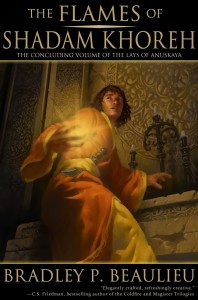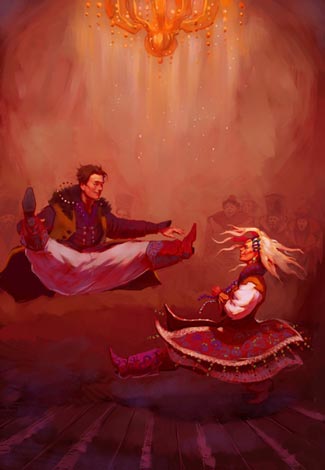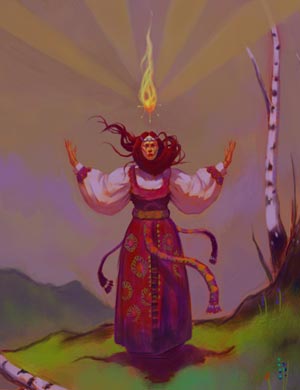
In 2011, I raved about The Winds of Khalakovo, the first instalment in Bradley P. Beaulieu’s The Lay of Anuskaya. I acquired the follow-up, The Straits of Galahesh, several months before it was released in 2012. Unfortunately, the first 50 pages felt impenetrable even after reading them a dozen different times. When Beaulieu announced the upcoming release of the final volume, The Flames of Shadam Khoreh, I committed myself to finishing the second novel in order to read the conclusion. Despite a long, arduous struggle through The Straits of Galahesh that never really abated, I’m so pleased to call The Flames of Shadam Khoreh a rousing success that exceeds all of the expectations placed on it by Beaulieu’s exceptional debut.
A rousing success that exceeds all of the expectations placed on it by [The Winds of Khalakovo].
Beaulieu’s third book begins nearly two years after the events of The Straits of Galahesh. War has moved from the islands to the mainland, and the Grand Duchy knows its time may be limited. The rifts between worlds grow ever wider, and Nikandr believes Nasim is the only one who can close them. I offer only the most basic of framework because to reveal more would result in endless paragraphs as to call Beaulieu’s narrative sprawling is a gross understatement. Before I go too far into what makes The Flames of Shadam Khoreh a success, I think it’s important to couch it in terms of what came before.

Beginning in The Winds of Khalakovo it was immediately apparent that Beaulieu and his editor, Ross Lockheart, were not terribly concerned with pace. Or perhaps it would be more fair to say both believed they had a Russian inspired Gone with the Wind in a second world fantasy. In many ways they did. Split into two ‘parts’, The Winds of Khalakovo takes its time, developing first a romantic triangle between Nikandr, the series’ primary protagonist, his lover, and his future wife, before moving on to the larger conflict centered around a weakening of the barriers between the human and spirit worlds. This structure, one he employs in all three volumes, creates a misleading and difficult rise and fall to the narrative. False climaxes boost the reader to a natural conclusion, before it comes crashing down to another long build up.

The Dance, art by Evgeny Maloshenkov
The Straits of Galahesh departs some from Nikandr, focusing more on Nasim. In the first book, Nasim is extant, but something of a non-entity as he suffers from an affliction that traps him between worlds. The result is behaviors that manifest in ways not dissimilar from severe autism. He emerges from this affliction in The Straits of Galahesh and dedicates himself to healing the rifts between worlds. This quest is the focus of the novel, unfortunately leading to long sections of exposition and, perhaps more distracting, jumps through time and space. Woven in to that is a continuation of Nikandr’s story, as well the expansion of the overarching narrative to include several new ‘villains’.
Where my main complaint in The Winds of Khalakovo revolved around its sense of pace, I never once questioned its actual storytelling which was consistently excellent. From individual scenes, to the larger construct, Beaulieu always knew where he was going and what he was trying to accomplish, layering in themes that echo those of the Russian Golden Age classics. The Straits of Galahesh doesn’t. Instead, it often feels like Beaulieu bit off more than he could chew with a story too large in scope to contain in a single novel. Nasim, Nikandr, and the as yet unmentioned (by me) Atiana and Sariya, checker the globe, visiting places, times, dreams, and memories with a constant churn of new characters and locales to catalog. Not to mention language that too often felt overworked,
More people filed into the room, mostly relatives, both close and distant, of Atiana’s, but there were others as well: diplomats, officers of the staaya, men and women of business and industry. Father had gone to great lengths hoping to impress upon the Empire that Anuskaya was no plum ripe for the plucking.
In The Flames of Shadam Khoreh, Beaulieu brings his characters together for the first time in the entire series. The result is a focused narrative that allows all his characters, and his excellent writing, to shine without the constantly jarring travel and transitions that plagued previous volumes. There’s also what appears to be an effort to be more clear and concise with his prose,
His feet shifted. He heard the skitter of stones as they fell over the edge and slipped down along the face of the cliff, but he didn’t care. Stones might fall, but he would not.

Rehada, art by Evgeny Maloshenkov
Most significant of all, Beaulieu introduces, for the first time, an everyman character: Styophan.
Throughout the series Beaulieu draws his point of view characters from the gentry or minority groups steeped in mysticism. In the case of Nikandr and Atiana, their background as nobles left them cold and removed. They deny their love, place their duty before themselves, and, other than some minor internal whimpering, never express their loss articulately. It codes authentic for the typical Russian suffering-as-a-means-to-redemption, but doesn’t make them particularly compelling. Styophan on the other hand is just a foot soldier in the war, a loyal servant to Nikandr and the Khalakovo household. He loves his wife, and wants nothing more than to have children with her. Instead, he’s shipped off to war, to die in a mission he doesn’t understand. Styophan provides a touch stone to the reader that grounds the entire series in reality, moving away from rifts between worlds and elemental magic. Combined with Beaulieu’s growth as a writer, and The Lays of Anuskaya‘s plot lines finally coalescing, Styophan’s brilliant chapters put The Flames of Shadam Khoreh in rarefied air.
In 2011 I called The Winds of Khalakovo ‘deep and deliberate,’ with poignant dialogue ‘that fits the thematic tones perfectly.’ I believed very strongly it was one of the most promising debuts of the year, kicking off what was a huge year of exceptional debuts for Night Shade Books. Two years later that promise is delivered in the form of Bradley P. Beaulieu’s self-published third book The Flames of Shadam Khoreh. Given the pacing problems throughout the series, I would argue that The Lays of Anuskaya was too ambitious for a debut novelist. If that’s true, then those difficulties are on full display in The Straits of Galahesh which I cannot recommend on its own.
One of the best epic fantasy endings I’ve had the pleasure of reading.
However, despite my difficulties with the middle volume, this final installment makes it all worth it. The Flames of Shadam Khoreh isn’t just one of the better books I’ve read this year, but one of the best epic fantasy endings I’ve had the pleasure of reading. To potential readers let me stress that this is not an easily digestible collection of novels. Quite the opposite. Instead, I would call it a collection of novels worth investing in. I promise it will pay dividends.


Indeed. Well said, Justin. Not for new fantasy readers, but deep, abiding and worth the effort.
I’m looking forward to reading the third book. Heck, if truth be told, I’m looking forward to even reading the first one, because I have it but it’s one of the many books I keep forgetting to pick up and start reading! The third book coming out has definitely spurred me on to reading it sooner rather than later, though.